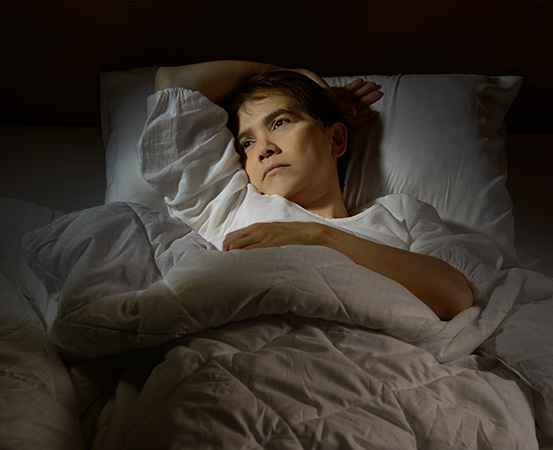Waking up in the middle of the night or at some other unearthly hour and not managing to go back to sleep seems to have become the norm for 48-year-old Meeta Das, who works at a school in Delhi. She says it was the onset of menopause two years ago that brought about her erratic sleep patterns accompanied by anxiety, fatigue, restlessness and daytime drowsiness.
While these are all common symptoms of menopause that signify the cessation of the menstruation cycle, usually beginning by age 45 continuing up to 55 and sometimes even longer, the insomnia is what worries Das the most since it has started affecting the quality of her life.
READ MORE :
Elders, here’s how Tai Chi can help you sleep better
“These days I simply cannot go back to sleep once I wake. I lie in bed watching the darkness outside and finally, as sunlight breaks through, I am exhausted [and] fatigued, and it’s a big task to get ready and reach my school by 7am,” says Das, adding that concentrating on tasks has also become difficult for her due to drowsiness.
Insomnia and menopause
Menopause is said to be linked to insomnia because the imbalance of hormones upsets the circadian rhythm (sleep cycle) in women’s bodies. These hormonal, physical and emotional changes occur naturally once a woman reaches menopausal age.
The time before and after a woman misses her period for a full year is known as perimenopause and postmenopause. This is when the imbalance in these essential hormones happen. In fact, it is during perimenopause that the ovaries first start to begin producing lesser amounts of estrogen and progesterone, and the symptoms of menopause (one of them being insomnia) increase.
According to ‘Sleep and sleep disorders in the menopausal transition’, a 2018 study published by the US government’s National Center for Biotechnology Information, disturbances in sleep increase during the transition period into menopause, with the most common complaint being night-time awakenings. This is important to treat since it impacts health across several years of the menopausal period.
Yet another study says the issue of sleep and menopause could differ from woman to woman. Different predisposing factors — such as past insomnia, factors of aging, hormonal changes, menopausal symptoms like hot flashes, night sweats, mood disorders, pain, sleep disorders, poor health and circadian modifications — could increase the risk.

A fall in production of progesterone — a sleep-producing hormone — means women might find it harder to fall asleep and stay asleep. Hot flashes, fatigue and night sweats also make them uncomfortable. Contrastingly, because of the imbalance, they can also experience unregulated bursts of energy or adrenaline that may make sleep even more difficult.
“With the imbalance in hormones, and more importantly progesterone that has a calming effect on women, it’s natural that there will be anomalies in the system,” says Dr Pallavi Aga, MD, nutritionist and lifestyle-management consultant at the Mind, Body and Wellness Clinic, Noida, Uttar Pradesh. “And then again, cortisol [a stress hormone] is on the rise, which is not good [since it brings] about weight gain and other health issues. Usually, there’s less of muscle mass at this age — for which [women] need to exercise regularly. There’s anxiety too and insomnia is natural.”
Dr Aga says that to minimise the detrimental effects of losing sleep during menopause, women should:
- not go on long periods of intermittent fasting
- eat clean carbs and veggies, and increase protein intake (vegetarians can take whey protein and meat eaters can have eggs, etc.)
- keep a check on vitamin D levels and thyroid
- take supplements such as magnesium glycinate and melatonin, zinc selenium and all the B vitamins.
In fact, if the symphony of all hormones — like estrogen, progesterone, cortisol and thyroid — is created, then this problem can be taken care of.
Insomnia: symptoms and treatment
Among the symptoms of insomnia are an inability to function well during the day, fatigue, anxiety, mood swings, cognitive impairment, relationship difficulties, waking early, inability to get back to sleep and difficulty doing routine things.
“Insomnia occurs in 80 per cent of women — all because of menopause, and sometimes they have underlying conditions that make it worse,” says Dr Monika Sharma, behavioural sleep medicine specialist and founder, Sleep Moksha, a clinic in Panchkula, Haryana. “Before menopause, they are protected and post that, they are not.”
Dr Sharma’s advice is to limit caffeine, which is found in soda, chocolates and ice cream too. Also, avoid spicy food, manage stress, drink less alcohol, have a cool sleep environment and dress in loose clothing. Keeping a bedside fan or wearing specialised clothes (like chilly pants) designed for menopausal women can help. Since there could also be a lack of oxygen while sleeping, an individual can consult a sleep expert, she says.

















